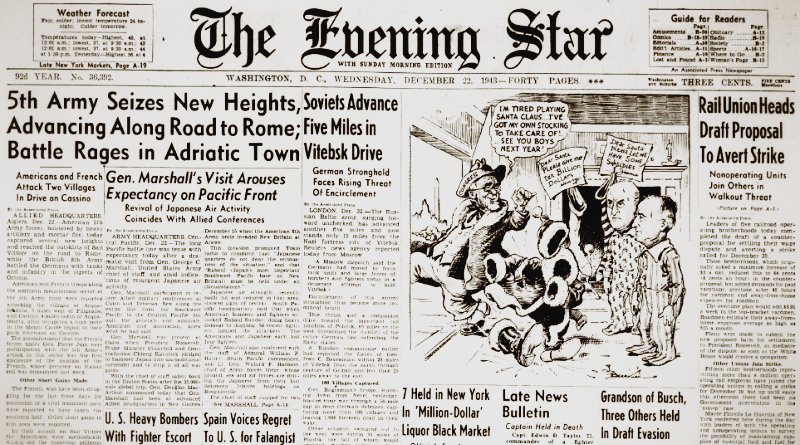World War II Chronicle: December 22, 1943
Click here for TODAY’S NEWSPAPER
A grandson of Anheuser-Busch (AB) founder Adolphus Busch has been arrested for draft evasion. Gert Hans Von Gontard is the son of Busch’s daughter Clara, who married Paul Von Gontard, who is German nobility. Von Gontard served as vice president of AB and president of the Mercedes-Benz. Adolphus’ oldest son August Sr. was AB’s President and CEO from 1913 until his suicide in 1934. His son Adolphus III currently runs the company and his younger brother Augustus Jr. takes over in 1946 when Adolphus III passes away in 1946. “Gussie” currently is head of brewing operations, and in 10 years will buy the St. Louis Cardinals baseball team… George Fielding Eliot discusses the Italian campaign on page 10…
Sports begin on page 16
Roving Reporter by Ernie Pyle
AT THE FRONT LINES IN ITALY — Late one dark night we were all in the gun pit on a firing mission, and during one of those startling silences that sometimes come in the midst of bedlam you could hear ever so faintly a few lovely, gentle strains of music.
One of the cannoneers said, “Hey, listen! It can’t be we’re all going crazy.”
And another one said, “Sure, it’s music. Don’t you know? — It’s one of those musical shells the Germans send over once in a while.”
None of us really believed we had heard music, but a little nosing around next morning disclosed that an anti-aircraft gun crew high up the hillside had a portable radio and we had heard it playing.
One night in the tent a soldier brought out a box from home and passed around some pecans that had been sent from his own farm.
“Just think,” he said. “Three years ago I had my hands on the very trees these nuts came from.”
“If you’re lucky,” another one said, “you can have your hands on them again in another three years — maybe.”
That’s the way conversation at the front goes all the time. Ten minutes hardly ever goes by without some nostalgic reference to home, how long you’ve been away, how long before you get back, what you’ll do first when you hit the States, what your chances are for returning before the war is over.
In one gun crew I ran onto there is a cannoneer who used to be a photographer for Harris and Ewing in Washington, back in the days when I worked in Washington. He is Pvt. Francis J. Hoffman. He has just been in the Army since March, and overseas only two months. He is a perfect example of the queer things the Army can do.
Hoffman had 18 years’ experience as a photographer, yet they listed him as a cook at first and made him a cannoneer. He doesn’t think he’s a very good cannoneer, but if they want him to be a round peg in a square hole he’ll do the best he can at it.
If you wanted to be romantic you could drum up in your imagination an artillery crew absolutely falling in love with its gun. You could imagine a gunner who wouldn’t sleep anywhere but in the gun pit.
I think I’ve seen it that way in the movies, and of course it undoubtedly has happened, but I don’t think very often. Certainly not with my crew.
One of our boys said one day during a lull, “That damn gun is driving me crazy.”
And another one said, “I even dream about the damn thing at night.”
At least half of the gun crews, I’d say, would like to get transferred to some other kind of work in the battery, such as cooking, running the switch board, or driving.
Pfc. Frank Helms, from Newberg, W.Va., is one of the more articulate members of the crew. He is 28 and married and has a 2-year-old baby at home. He is a coal miner.
Frank has ideas on everything, and comment to make. He calls this Italian campaign a “mudaneering” campaign. He carries a four-leaf clover inside a plastic disk about the size of a watch. Somebody from home sent it to him.
Frank thinks the Government out to take over the coal mines and end the strike trouble. He says he’d like working in a Government-operated mine.
He says he has the damnedest quirk — he doesn’t smoke a great deal, but the moment the crew is called to the guns and gets just about ready to put the shell in he goes crazy for a cigaret. It is all right to smoke in the gun pit, and everybody does, but when that urge hits him he can’t always take time to light one right away.
Helms is one of the boys who say the gun is driving them crazy, but if that’s true he’s mighty good-natured about it.
The one who dreams about the gun is Pfc. Raymond Wilson of North Pittsburgh. He is the No. 1 cannoneer, the one who closes the breach and pulls the lanyard. He is about the only one of the crew who doesn’t play poker. He says he’d rather waste his money some other way. He is only 20.
It’s an odd thing about both these boys hating the gun, for they seem to be the two most conscientious ones in the crew.
Evening star. (Washington, D.C.), 22 December 1943. Chronicling America: Historic American Newspapers. Lib. of Congress.
https://chroniclingamerica.loc.gov/lccn/sn83045462/1943-12-22/ed-1/
